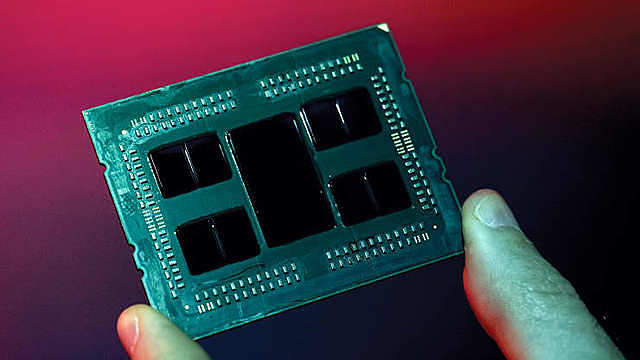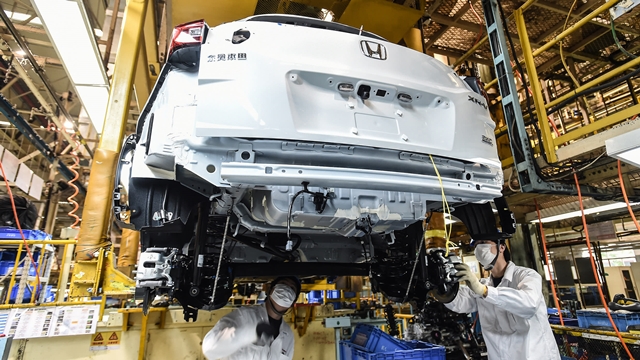The global ‘thirst for’ chips is starting to have big consequences
- Tram Ho
As technology progresses, semiconductors are also becoming more common, appearing in products ranging from computers and cars to toothbrushes and clothes dryers. Currently, they are an indispensable component in a large number of products in daily use.
However, the demand for chips has consistently outstripped supply. Car manufacturers are no longer the only “victims” who feel the heat on the back of the neck.
Alan Priestley, an analyst at Gartner, told an ordinary person who stumbled across the street, he would most likely be affected by a global chip shortage in some way.
“It could be a failure to buy the product you want, or the price of your favorite product going up,” says Priestley.
South Korean tech giant Samsung last week said chip shortages were affecting the TV and home appliance manufacturing sector, while LG also admitted that the situation is indeed a big risk. .
“Given the shortage of semiconductor chip supplies, we are experiencing some impact, especially on our ability to manufacture certain sets of products and displays,” said Ben Suh, chief executive officer. Samsung investment system.
“We are discussing with retailers and main distribution channels about supply plans so that we can focus on producing more important or higher priority products.”

The second generation of chips The Epyc produced by AMD during the launch event on August 7, 2019. Photo: Getty Images.
Samsung CEO and Mobile Division Director Koh Dong-jin shared during a March shareholder meeting that in the IT sector, there is a serious imbalance between the supply poles and the semiconductor chip bridge. At the time, the company said it might have to postpone plans for the launch of the new Galaxy Note line.
LG said that “the company is trying to control the situation as no manufacturer can avoid the effects if the shortage of chips persists,” according to the Financial Times.
Everyday household products also face risks
The production of low-profit chips, such as chip for weighing in washing machines or baking chips in smart toasters, is also affected. While most retailers are still very easy to access such products at the moment, they may face shortages of supply over the next few months.
Even the dog shower business has been affected, according to The Washington Post. CCSI, the company that moved production of electronic dog baths in Illinois, was recently told by its chip supplier that chips they normally use are currently unavailable.
The company was offered a different line of chips, but that forced them to tweak its motherboard products, leading to higher production costs.
“This situation affects all aspects of the manufacturing sector, from individuals to large corporations,” said Russell Caldwell, president of CCSI International.
Many companies, especially in China that have been affected by sanctions, are increasing their capacity to stockpile high-demand chips in order to weather this storm, but that is only. making it more difficult for other businesses to access chip products.
The car manufacturing sector is the biggest victim
Car manufacturing, which relies heavily on the chips used in engine management and driver assistance systems, is the sector most hit. Companies like Ford, Volkswagen and Jaguar Land Rover are shutting down factories, reducing workers and cutting production.
Stellantis, the world’s fourth-largest car manufacturer, said that chip shortages got even worse in the first quarter of 2021. Richard Palmer, the company’s chief financial officer, put it up. warns that this disruption could last until 2022.
Some car manufacturers are cutting out modern features in cars when they don’t have the necessary chips, according to a Bloomberg report.

Car manufacturing, which relies heavily on the chips used in engine management and driver assistance systems, is the sector most hit. Photo: AP.
“Ram also removed this feature on Tradesman, Bighorn, Rebel and Laramie models because of the lack of necessary components,” a company spokesperson told CNBC. The company will return to offering these features later this year, Nissan said it will cut down on the navigation feature, while Ram Trucks is planning to eliminate the blind spot warning feature on about 1,500 vehicles sold. download.
Renaul also stopped equipping large screens behind the wheel on certain models.
Car rental companies are also gradually feeling “hot” when not being able to buy the new car products they want, according to Bloomberg. Hertz and Enterprise, two companies that buy cars in bulk and then lease them back, said they had to switch to buying second-hand cars through auction.
“The global shortage of chips has affected the entire rental sector’s ability to get new car products,” said a Hertz spokesman.
Hertz says the company is replenishing its fleet through the acquisition of used cars that run a few miles from auctions or by dealerships.
An Enterprise spokesperson said the chip shortage “has affected the supply and delivery of new vehicles in the context of high market demand.”
Complex problem
TSMC – the world’s largest chip maker – said the company can meet the chip demand of the car manufacturing industry in June next.
But Patrick Armstrong, CIO of Plurimi Investment Managers, says that goal is a bit too ambitious.
“If you listen to the point of view from Ford, BMW, and Volkswagen, they all emphasize that there is a bottleneck in the production capacity and they cannot have enough chips to produce new products.” This situation can last up to 18 months, he said.
“The current situation is something I have never seen before,” said Reinhard Ploss. “It certainly takes time” until supply and demand return to equilibrium. “I think 2 years is too long, but at least we should see that equilibrium by 2022.”

The chip is mounted on the motherboard of the computer. Photo: Getty Images.
“You can’t just go to a chip distributor and say ‘give me a million new chips’ if you don’t submit a pre-order, because it’s not a ‘instant noodle’ process. “, according to Priestley. “If you place an order today, and their production capacity is still available, it will take you 3 months to get what you want.” Increasing production capacity is definitely not going to happen anytime soon. one-way.
He also added that the majority of consumer products have expanded supply chains, and “we have yet to see the tangible effects” of chip shortages on some areas. “If Apple wants to launch a new phone product today, they have to wait until the end of the year to be able to have a product to hit the market.”
The car manufacturing problem, meanwhile, is a lot more complicated because they often don’t use the most modern chips, according to Priestley.
“They tend to use chips produced through an older process, and sister manufacturing companies are moving towards making innovative products with high economic efficiency, because There, they invest less in old production lines, “he said.
Technology sovereignty
Countries are forced to find ways to increase the amount of chips they can produce. The majority of chips used worldwide are made in China, and the US is the second-largest producer.
The European Commission says it wants to increase chip manufacturing capabilities in Europe, and sees it as part of an effort to increase autonomy over key technologies.
Europe currently accounts for only 10% of the global market for chip production, although that figure is 6% higher than five years earlier. They set a target of 20% market share and are planning to invest 20-30 billion euros to realize that goal.
Intel has also offered to help, but the company said it wants to receive about 8 billion euros in subsidies to build a semiconductor chip factory in Europe.
Pat Gelsinger, CEO of Intel, met with two European Commissioners in Brussels, including Thierry Breton, days after he met face-to-face with German government ministers.
“What we want to get from the US government and European countries is to make us more competitive here than in Asia,” Gelsinger said in an interview. problem.
Intel also announced in March that it intends to invest $ 20 billion to build two new chip factories in the state of Arizona.
“It will take two to three years before we see those ambitious plans come to fruition, according to Priestly.” But it will only help meet future needs. ”
Source : Genk
